Angela Slatter's Blog, page 82
June 21, 2015
Because I am spoiled …
… in my writing career I have been so lucky in the artists I’ve interacted with – and I’m extra lucky today because the very talented Belinda Jane Morris read the extract I posted on this site from “A Good Husband”, one of the Sourdough stories. It’s also recently reprinted in Paula Guran’s Prime anthology, Mermaids and Other Mysteries of the Deep.
And this is the gorgeous result!
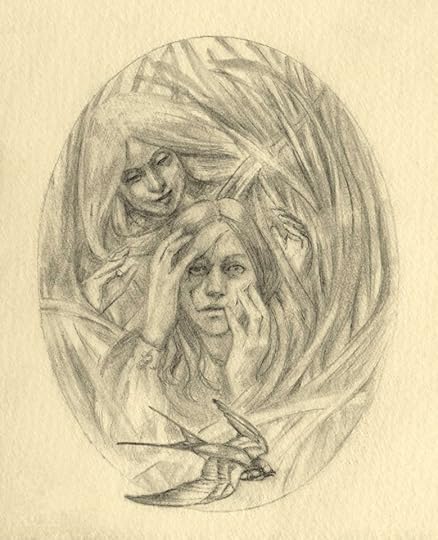
Belinda Jane Morris
June 18, 2015
Over at the Place of Mark Barnes: On the Importance of Being Edited (and Editing)
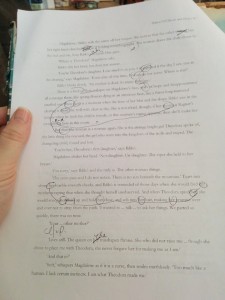
Author’s own mess.
The lovely Mr Mark Barnes asked if I’d write a short blog post for him about how important editing is to your work at every stage. I wrote a lot. May contain ranting, but there is also lots of useful stuff there too.
There’s a particular kind of arrogance that can trip up a new writer (and sometimes even an experienced one) and it goes something like this, “I just wrote The End, so it’s all done.”
No.
The End, to paraphrase The Mummy’s Imhotep, is just the beginning.
Your first draft is just that: a draft. It needs tender loving care as well as brutal pruning to shape it into a piece that’s not only something someone wants to read, but also something that someone (i.e. an editor/publisher) wants to (a) put into print and (b) pay you for.
Editing is a form of auditing and before an experienced editor/publisher will look at your work you need to make sure what you’re sending to them is the best you can produce. You must go over your own work to make sure that you have actually written what you think you’ve written: are spelling and grammar all present and correct? Does the ending match the beginning? Is the story’s internal logic flawless? Do characters act in a manner consistent with their motivation and characterisation? Are those characters believable and engaging or merely cookie-cutter stereotypes that interest no one? Does the pacing work as it should or does the story have a flabby middle that needs tightening? Are your descriptions apposite and sharp, rather than simply a bruised purple mess? My expertise is in short stories, but most of what follows can – and should – be applied to longer works as well. I can’t cover everything here, but I’ll do my best.
The rest is here.
June 14, 2015
Movies and Memories
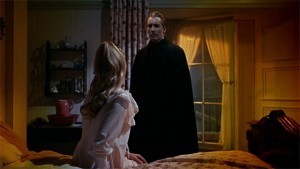
http://www.midnightonly.com/wp-conten...
I spent yesterday being unwell and so curled up for some quality time on the couch. I watched three of the Hammer Horror Dracula movies, which seemed appropriate given Christopher Lee’s recent demise, and his place in my heart as Best Dracula Ever. Apart from anything else, I just love these movies even if the blood does look like strawberry jam. I mainlined Horror of Dracula, Dracula Prince of Darkness and Dracula Has Risen from the Grave, and it was this third one that proved most interesting.
The opening scenes – a body in a church bell, hickey from hell on her neck – threw me back in time.
I’m ten or eleven and my family’s visiting friends for dinner. After the meal, the adults are still talking at the table and we kids drift away, into the lounge room. It’s after 8.30 and we turn the television on (after asking permission) and there they are: the bloody trails like spilled strawberry jam, the corpse swinging down from the inside of the church bell – and I’m hooked. I’m in love, but I’m also fearful and not just because that’s the point of a Hammer film. Although my reading matter was never, even censored, television was fairly stringently monitored, so I knew this was a movie I wouldn’t be allowed to watch.
So, I’m viewing this Highly Inappropriate Film, drinking in the lush scenery, the beautiful leads, the amazing presence that is Christopher Lee, the glorious costumes, the settings, the campy acting, the pulpy story, the over-the-top musical score designed to scare as much through volume as anything else, and, of course, the strawberry jam blood. I’m watching it in fascination and apprehension, terrified that it will be taken away from me – that my parents will see what’s on the telly! That was probably a more intense fear than my first sight of the Undead, and I’ve no doubt that the threat of loss added, over the years, to my memories of the frights accompanying the movie.
Now, keep in mind that my childhood occurred roughly when dinosaurs walked the earth,
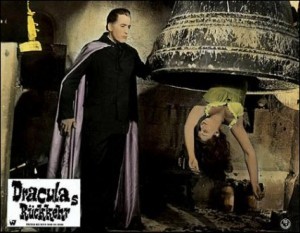
http://www.esplatter.com/images/dracu...
so it was a very different time as far as television was concerned: repeats were few and far between, there was no iView, no video recorders, no Foxtel, no Netflix – it was an era even before video stores had been invented. So, if you missed a movie you probably weren’t going to see it again for a long, long while.
Of course, what happened was that it was time to go before the end of the film. I remember dragging my feet as we went out to the car, bitterly resentful at the deprivation – the theft! – and filled with the utter certainty that I would never, ever find out how the ending. How could I imagine that over three decades later I’d be slumped on a couch, beneath a doona, feeling sorry for myself … how could I imagine myself being so very bloody old?
But what yesterday’s viewing showed me was this: the images that made such a powerful impression on me have stayed with me. Truth be told, I clung to them, did my level best to keep them clear and unsullied, to keep the sensations they’d brought intact also. Of course, over the years, memories change and fade, gaps erupt and other similar recollections or things we’ve made up fill in the holes. But the images I kept from this film were so strong that they feel, when I examine them now, as if they’d embedded themselves in my bones. As I sat watching, over thirty years later, a thunderous echo of that original dread anticipation that the ending of the movie would be snatched away from me was perched in my chest (I was half-looking over my shoulder, certain my mum would turn up, shaking her finger at me!). I experienced the same thrill, the same frisson, as I had as a child, when I first fell in love with horror and Hammer.
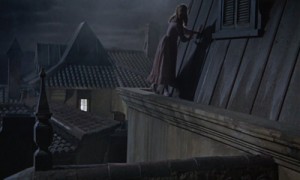
http://41.media.tumblr.com/4SVE1h61Ff...
And there’s something more: when the female lead walked across the roofs to go to visit her beloved, I realised just how deeply this film is in my subconscious: I’ve used roof-walking scenes in two of my own stories – “The Story of Ink” and “Spells for Coming Forth by Daylight” – albeit there are no vampires in those tales and my characters are fleeing, not heading towards romantic assignations. We all write conscious tributes to or riffs on something we’ve loved as readers or viewers, but the resurgence of the unconsciously embedded in this way is fascinating.
I’ve always known that a lot of my writing is founded in the fairy and folk tales I was read as a child, in the mythology and history that I later read for myself, but I’d not realised that something like this wonderful old Hammer gorefest was also responsible in its own way for the genre I chose to write. Watching this film – all the way to the end at long last! – and experiencing once again all those sensations of wonder and dread delight, has been like falling in love all over again, making me remember why I write what I write.
June 11, 2015
HORROROLOGY: THE LEXICON OF FEAR
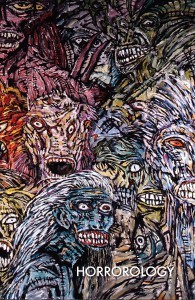 And here’s another secret I’ve been sitting on for ages, the new anthology from Stephen Jones and Jo Fletcher Books Horrorology: The Lexicon of Fear, with cover art and internals by Mr Clive Barker.
And here’s another secret I’ve been sitting on for ages, the new anthology from Stephen Jones and Jo Fletcher Books Horrorology: The Lexicon of Fear, with cover art and internals by Mr Clive Barker.
And yes, I’ve got a piece in it, a novella called “Ripper” of which I’m inordinately proud.
I’m also inordinately proud of sharing the ToC with these good folk:
Clive Barker, Robert Shearman, Michael Marshall Smith, Pat Cadigan, Mark Samuels, Joanne Harris, Muriel Gray, Kim Newman, Ramsey Campbell, Reggie Oliver, and Lisa Tuttle.
Ze blurb:
Amongst the shelves in the Library of the Damned is a book that is the most terrible of them all: The Lexicon of Fear. Now reprinted for your pleasure – and horror – are some of the secrets contained within.
In the Library of the Damned, hidden away amongst that vast depository of ancient wisdom, there exists a certain bookcase where the most decadent, the most blasphemous of tomes sit upon a dusty shelf.
And amongst those titles – that should never be named – there is one volume that is the most terrible, the most hideous of them all. That book is the Lexicon of Fear.
But, long ago, some of its pages were ripped from the binding and spirited away by a lowly student of the ancient science of Horrorology, who was determined the secrets contained therein would one day be shared with the world.
And now that day has come. These are the words that comprise the very language of horror itself, and the tales they tell are not for the fainthearted. But be warned: once you have read them, there is no turning back. Soon, you too will know the true meanings of fear . . .
Publication date is 1 October 2015. More details here.
June 10, 2015
Of Sorrow and Such cover reveal
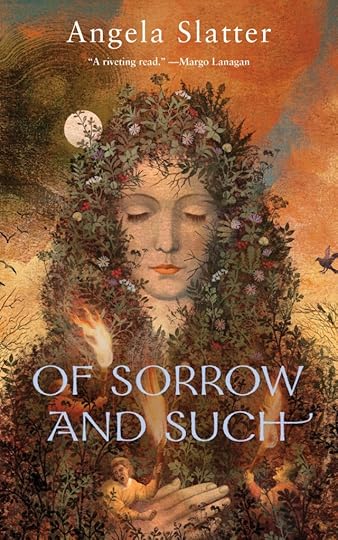 The things that happen on the other side of the world while you’re fast asleep! Tor.com revealed the cover for my novella Of Sorrow and Such. The artwork is by the wonderful Anna and Elena Balbusso (who also did the cover art for Nicola Griffith’s Hild) and designed by the lovely Christine Foltzer – and most excellently arranged by the legendary Irene Gallo. Thank you to Lee Harris for buying the novella in the first place!
The things that happen on the other side of the world while you’re fast asleep! Tor.com revealed the cover for my novella Of Sorrow and Such. The artwork is by the wonderful Anna and Elena Balbusso (who also did the cover art for Nicola Griffith’s Hild) and designed by the lovely Christine Foltzer – and most excellently arranged by the legendary Irene Gallo. Thank you to Lee Harris for buying the novella in the first place!
I’m soooo happy with it as it shows the character of Patience precisely as she exists in my head. It’s publishing on October 13th, 2015 – and I’ll be at WFC in Saratoga Springs in early November if you’d like a copy signed. For fans of Sourdough and Bitterwood, this tale is set in that world and revisits Patience (Sykes that was, now Gideon) from two of the Sourdough stories.
The delightful Margo Lanagan says “Of Sorrow and Such takes you to dark, unsettling places. Angela Slatter’s magic is earthy, bodily and beleaguered; in the hands of tough, clever Patience Gideon it’s a powerful instrument for wresting justice from a hostile world. A riveting read.”
And the equally delightful Juliet Marillier says “Of Sorrow and Such is Angela Slatter at her best. Characters and settings spring fully alive from the page, and the storytelling provides rich nourishment for both intellect and spirit.”
From the catalog copy:
Mistress Gideon is a witch. The locals of Edda’s Meadow, if they suspect it of her, say nary a word—Gideon has supported them, and it’s always better to keep on her good side. Just in case.
When a foolish young shapeshifter goes against the wishes of her pack, and gets herself publicly caught, the authorities find it impossible to deny the existence of the supernatural in their midst any longer; Gideon and her like are captured, bound for torture and a fiery end.
Should Gideon give up her sisters in return for a quick death? Or can she turn the situation to her advantage?
Ordering details when they come to hand!
June 8, 2015
The Sourdough Posts: A Good Husband
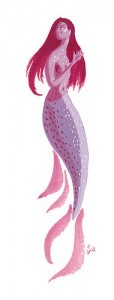
Random mermaid by Kathleen Jennings
“A Good Husband” came from my researches into water creatures. I didn’t want quite a mermaid because, well, everyone’s got a mermaid (note: yes, I know all the art here is mermaid’ish). But then I found mention of the mari-morgan, a Welsh/Breton water spirit; they drown men as well as any mermaid, they’re beautiful, they cause floods and disaster. Perfect.
I started thinking about how boring it has to be, being eternal. I wanted her to be a solitary creature, worshipped, a woman’s kind of idol, but that should also play into her aloneness. I wanted her to have her own yearning, her own particular thing to envy the human girls: lovely dresses. So she bargains with the girls who come to her for favours, and asks for lovely dresses in return – but that never works out, a lesson in finding what you wish for never being quite right. But then Kitty comes along, with her clever seamstress’s fingers and her deep-running desire – for something as pointless (and constantly disappointing) as the mari-morgan’s dresses: a good husband.
“A Good Husband” has most recently been reprinted in Paula Guran’s Mermaids and Other Mysteries of the Deep (via Prime Books – and in which you should also read Lisa Hannett’s “Forever, Miss Tapekwa County” and Genevieve Valentine’s “Abyssus Abyssum Invocat”, because = FLAIL SO GOOD).
A Good Husband
The water here is sweet.
This lake is wide enough and deep enough to give me the space I need. At the northern end a stream flows in bringing water from a larger river many miles distant; at the southern end a tributary flows out far, far away to the ocean. There the taste changes and becomes salty, the colour murky. Fine enough for my cousins with their scaled tales and sharp nails, frilled gills and tiny teeth. Well and good for the sirens even more distant relatives, creatures who cannot decide between water and air, whether they are fish or fowl. Such bitter water is not my choice though, oh no.
I love this place. It’s somewhere between a small lake and an overly large pond, a strange
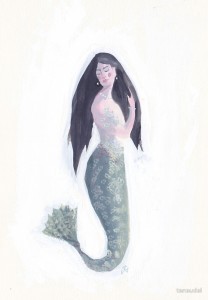
Another Kathleen mermaid, which you can and should buy here http://www.redbubble.com/people/tanau...
in-between thing, to be sure. The important thing is this: it’s mine and mine alone. In some spots there are reeds, in others rocks for sitting while I comb my hair, grassy banks, and a thick screen of trees providing cover from the casual onlooker. I get visitors, oh yes, but only the women of Briarton (the town through the trees and over one hill, nesting in a gentle valley) come here with any kind of regularity. It’s mostly the unmarried girls. The Lake of the Mari-Morgan is a place they have claimed for themselves. They come here to dance and sing and play. Before a special occasion like a wedding, they will conduct their toilettes n the waters of the lake, washing their hair to make it shine and their skin so it glows (the water here is said to have beautifying properties – it’s true, my little gift to them). With gifts, large and small, they beg my favour, pray, cry, gives thanks, rail at fate or me (whichever pops into their heads first), yearn and sometimes get what they want. If I can grant a request, I generally do. Sometimes I chose not to, simply so they do not take it for granted; on those occasions they seem to assume their wish was not worthy, or their offering even less so.
I do quite like them, little humans, with their funny hearts and minds, their queerer souls. If I am honest, I find them amusing. If I am even more honest, the company they offer is worth the expenditure of magic to give them their heart’s desire. I am a solitary creature but sometimes the isolation makes me ache.
Seldom do I show myself nowadays when they make their requests. Not that I am less beautiful or less vain, but I am infinitely more tired. If they see the weariness in my face, then what hope for them when an ageless being looks to have lost her spark? I speak only when I choose and it seems to work best as a disembodied voice – perhaps it’s the god-like quality. When I do appear it’s to make a point, a scene, a statement. Sometimes a clever girl will express, in front of her companions, disbelief that I exist. She might stand on my favourite rocky seat, the one a long step from the shore, and declaim her cynicism. What better way to prove her wrong than to be seen, gliding over the lake, all a-glimmer?
Their mothers seem to stop coming after marriage. I have often wondered if their hope dies then, or marriage was simply what they wanted. Having achieved it, they are content to chew on that same meat.
This one, this tall thin woman who comes all hesitating through the trees, is different though. This one I am fascinated by, oh yes.
She leans down close to the liquid mirror of the lake. She has visited here since she was a little girl, always bringing a tiny offering of some kind: flowers, sweetmeats, salted fish, embroidered pieces of rag made beautiful with her cunning stitches. She has never asked for anything in return, not ever, not even before her own wedding. The name the other girls call to her is “Kitty”; she sews for them. They have dressed in marriage and ball gowns of her making after bathing in the waters of my lake. I have seen those dresses wrapped in sheets and draped carefully over bushes and branches until the moment they are required. I’ve watched Kitty sewing them by the water’s edge, smiling gently as her companions laugh and dance around her while she toils on their behalf.
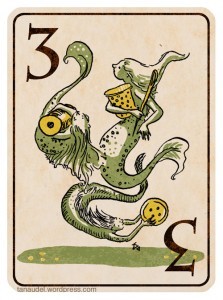
And more Katie-maids
This day, this hour, the scars on her face are still fresh, the reddish-brown of dried, scabbed blood. Two parallel lines run across the bridge of her nose before dropping down her left cheek. She will never be pretty again – and she was pretty, I will tell you that. Large blue eyes, a doll’s pouting mouth and hair that was most glorious – is most glorious still, yet looks like a joke now perched on the mess of her face.
When first it happened, she came here to weep. Blood was still flowing and mixed with her tears to drip into the water. That got my attention: grief and blood. Sacrifices very few ever make, although she did not know it for a sacrifice and there was no one to tell her.
Her friends urged her to wash her face in the lake and it did some good, made the healing faster, but in truth the scars will never be gone. There was too much force behind them and too much spite – that’s what makes them so deep, the spite. It bites not merely the flesh, but also the soul.
Kitty stares at her reflection, her features set in a determined way. She peers intently as if she might be able to see me through sheer force of will – she cannot although I lie right beneath her, studying her intently through the pane of water. The wounded woman opens her mouth and says, ‘Help me.’
Her tears start again and I can taste their salt as they drop down, forming ripples in my home.
‘Help me,’ she says again. ‘Mari-Morgan, please help me.’
I kick away but make no disturbance in the glassy stillness. Blood and tears she gave me already, all unknowing. For this reason alone I must make answer to her summons. She will ask something great of me, something I may not be able to deliver. I can only throw out an obstacle for her and hope she will give up.
Rising, I become visible, walking across the surface as if it is solid. I know how I must look to her when she’s so ruined. I can see my reflection in her large eyes: silver-green hair, silver-peach skin, eyes like a deep lake that cannot decide between blue or green or black, and a not-quite-stable outline. I ripple, I shimmer, my element is also my essence – in a bright light you might even see through me. I defy the eye to focus properly.
‘What would you have of me?’ I ask in a voice that sounds like a rushing flood. She shakes her head at this hoped-for appearance and I can see that she did not quite believe it would happen. All these years she has brought offerings to a creature she was not quite sure existed. I am both touched and vaguely annoyed.
‘Make him kind. Make him love me. Make him a good husband. Make my life better.’ Her long hands move to her scarred visage even though she seems not to notice. She doesn’t quite touch the wounds and they must ache still, stretching tight and itching as they dry and knit. Kitty knows how much she asks.
‘What will you give me?’ I ask, as if the dripping blood and flowing grief were not enough. ‘Nothing can be given without something in return, oh no.’
‘What will you have? Ask anything,’ she says unwisely.
A long time ago when I loved to be seen, when I was younger, less tired, more arrogant, 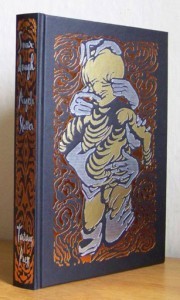 then, for a time, I asked for dresses. I wanted, silly conceited thing, to wear the pretty clothes the human girls did, to adorn myself like the colourful birds that nest in the trees along the banks. And the maidens brought them to me, exquisite things, almost works of art and oftentimes more than the girls could afford – I’m fairly sure some of them dropped their own wedding dresses into the lake. I marvelled over them as they were held above the surface, watched as the sun glinted on buttons and silken bows, crystals and beads and velvet ribbons. They looked so lovely out there in the light when they were dry. Their owners would throw these glorious gowns into my lake and they would grow heavy with water and sink. I would scoop them up and struggle into the sodden frippery and find the garment, bereft of air and sun, had somehow died. Swimming in wet clothing is difficult to say the least. Shimmering and shimmying, floating and darting through water and lake weeds is neither easy nor pleasant when attired in a sodden drape of fabric. So I stopped asking for this particular kind of gift. I gave up and embraced my watery nakedness, my uncertain outline and the translucent nature of my body.
then, for a time, I asked for dresses. I wanted, silly conceited thing, to wear the pretty clothes the human girls did, to adorn myself like the colourful birds that nest in the trees along the banks. And the maidens brought them to me, exquisite things, almost works of art and oftentimes more than the girls could afford – I’m fairly sure some of them dropped their own wedding dresses into the lake. I marvelled over them as they were held above the surface, watched as the sun glinted on buttons and silken bows, crystals and beads and velvet ribbons. They looked so lovely out there in the light when they were dry. Their owners would throw these glorious gowns into my lake and they would grow heavy with water and sink. I would scoop them up and struggle into the sodden frippery and find the garment, bereft of air and sun, had somehow died. Swimming in wet clothing is difficult to say the least. Shimmering and shimmying, floating and darting through water and lake weeds is neither easy nor pleasant when attired in a sodden drape of fabric. So I stopped asking for this particular kind of gift. I gave up and embraced my watery nakedness, my uncertain outline and the translucent nature of my body.
But now here is a clever, clever girl with brilliant, cunning fingers who sews the way my sea cousins create storms, with the same aplomb and passion.
I make my request and see her heart sink. My unkindness will save her further distress, I tell myself. If she cannot fulfil my price, then both our lives will be easier. One should not ask for what one thinks one wants, it is never the same as it seems when you are not in possession of it; like those dresses, so lovely in the sunshine, so disappointing in my hands.
***
June 4, 2015
A Book of Bizarre Myths and Chimerical Fancies
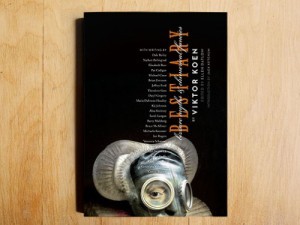
OLYMPUS DIGITAL CAMERA
I’m so delighted to have a piece of writing in this gorgeous Bestiary that accompanies Viktor Koen’s amazing mixed media photography.
Ellen Datlow pulled together all the writers for this, including Pat Cadigan, Sonya Taaffe, Nathan Ballingrud, Jeffrey Ford, Bruce McAllister, Anna Tambour, Brian Evenson, Michael Swanwick, Michaela Roessner, Ian Rogers, Alisa Kwitney, Dale Bailey, Sarah Wishnevsky, Kij Johnson, Theodora Goss, Daryl Gregory, Maria Dahvana Headley.
Viktor says:
Bestiary is the product of a long fascination with Greek mythology and early nineteenth-century photography. Based on a set of mostly hybrid creature descriptions and influenced by religious iconography, myth comes full circle and meets social criticism by molding these monstrous archetypes into contemporary commentary. Most important, in this series, the beasts are separated from their usually singular dimension, assuming complex, tragic personalities in which monsters and heroes become difficult to tell apart.
Being enamored of the beauty of beasts is an obsession that periodically creeps up on me and demands expression in mysterious ways. This time, what I found in vintage prints wasn’t only an abundance of captivating subjects willing to be transformed into legendary creatures, but also a language of archiving, processing, and signing documents that, along with the passage of time brutally aging them, was visually compelling and worth preserving.
Bestiaries are, traditionally, catalogs in which the narrative of a natural history and illustration of beasts is usually accompanied by a moral lesson. This Bestiary is no different. Today, nature and science intertwine in ways that at times prove to be less than ideal, and this compilation of brutes is a testament to this exact point.
The photographic exhibition is showing in the Benaki Museum in Athens, Greece.
Reminder: SF Travel Fund
 Just a reminder that the Kickstarter to send the very talented writer and reviewer Haralambi Markov to WFC is still going. 12 days and roughly $1400 to go, so if you’ve got any spare shekels, throw them this way.
Just a reminder that the Kickstarter to send the very talented writer and reviewer Haralambi Markov to WFC is still going. 12 days and roughly $1400 to go, so if you’ve got any spare shekels, throw them this way.
June 3, 2015
The Sourdough Posts: Lost Things
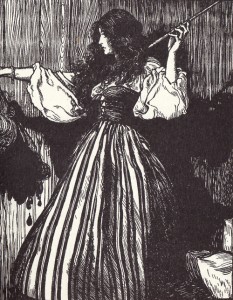
Rackham’s Sweet Roland
“Lost Things” is one of my personal favourites in the Sourdough collection, I think possibly because there’s a genuine comedic turn to it. It’s black comedy, to be sure, but I love Jez and her way of looking at things, I love how she interacts with Faideau and the Robber Bridegroom, even when she’s scared she can’t keep the smartassery concealed. Most of all I think I love that there’s such a vein of sadness running through everything she says and does, though most folk in the story aren’t perceptive enough to catch it.
“Lost Things” is the last story in the little triptych roughly in the middle of Sourdough, with “Ash” and “The Story of Ink” being the first two instalments of her life. Rob Shearman said in his Introduction to Sourdough “Some stories bounce off the other, so that what may read simply enough is thrown into colder and disturbing perspective by the tale that succeeds it. ‘Ash’ is a haunting tale of witchcraft – but it is made great by ‘The Story of Ink’ that follows, which turns ‘Ash’s’ redemptive ending on to its head with harsh irony – and ‘Lost Things’, the black comic tale of yearning for a mother’s love that follows, gives an extra twist to the pair of them.”
I love that she tries to put things to rights – even though nothing that’s happened was as a result of her actions – and yet, as always in these stories, nothing quite goes according to plan.
Lost Things
I’m just a boy, I keep telling them. A common footpad.
No one believes me. Which shows that (a) they’re a suspicious lot, and (b) not as stupid as they look. But still, it would be nice if someone believed me just once. It’s partially true: I’ve been working as the cook’s boy (although working is a very strong word) for this group of robbers and thieves, but I’m actually a girl. And I’m a map. The map.
Well, maybe not the map in the greater, more universal sense, but the map for which this lot are looking. They just don’t know they’ve got it. Or, they didn’t until yesterday afternoon when I tried to dodge under the Boss’s arm (strictly speaking, he’s a Robber Bridegroom but that’s a bit of a mouthful every time you address him) as he tried to swipe me for some infringement and grabbed my shirt. The damned thing’s so old it’s got no strength left in the weave. The moment pressure greater than a summer breeze got hold of it, it tore and left me in all my small-breasted, seventeen-year-old glory as an object of unhealthy interest for the merry men.
I’ve been able to get away with being a boy because I am seriously flat as a board, no bosomy wench me. In fact, the worst that could have happened as a girl would have been a bit of rough shagging, but the Robber Bridegroom saw the map, didn’t he? So I was stuffed, wasn’t I? I mean, my virtue’s safe ‘cause he’s got me under lock and key (well, lock and key in the sense of a withy cage in the back of the outlaws’ cave), with orders that anyone who touches me will be strung up from the nearest oak tree and left to hang until the flesh drops off his bones.
I’d like to tell them that I’m a princess in disguise running away from a arranged marriage, but I’ve got no hope with that porky. My accent screams “nasty part of town” with bells on, and when I lived in the city I spent more than enough of my time dodging the Peelers, I can tell you.
I’m no one important, but someone who was important got their hands on me for a time. He inscribed this bloody map on my back, about ten inches by ten inches, the map to the places where lost things go. The Boss has been looking for it for some time now.
The door to the cage creaks opens, and I jump. The breakfast delivery may be a chance for escape. I tense in case I can get past whatever idiot they’ve sent. I must look for all the world like a rabbit set to bolt – which looks pretty silly, really.
Faideau, a tall wiry boy looking not much older than me, stands in the breach, in one hand a lump of bread, in the other a wooden cup of what is probably curdled goats’ milk. I’d have called him friend until yesterday. He gives me a look of exasperation. ‘Honestly, you’re just determined to piss him off, aren’t you?’
‘Oh shut up. Give me that, I’m hungry.’’
He hands over the bread and the cup. I hate goats’ milk but it’s the only thing will soften the bread. He pulls something green from his pocket and waves it at me, teasing.
‘An apple! You stole that from the Boss’s private stash,’ I breathe in admiration. He grins and sits down beside me on the bed of dried bracken. With surprising strength, he twists the fruit in half and hands me my share. As I grab at it, Faideau eyes the tattoos that cover my right index finger, but politely doesn’t mention them.
I bite into the juicy sharpness. I’m even happy to share – it’s the first bit of fresh produce I’ve had in three months for the Boss is a dog-in-the-manger when it comes to this sort of thing. Whenever we manage to hijack a shipment of vegetables and fruit, there is no sharing. Although don’t know why I thought the lair of a band of footpads would be a haven of tasty treats.
To be honest, I wasn’t thinking at all. I had a little misunderstanding with the Authorities 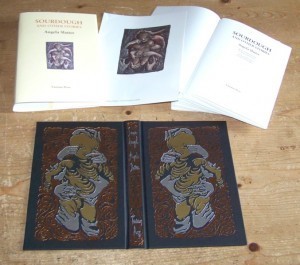 in the city and well, I hid in a cart that was rolling its way along Busynothings Alley and out under the main gate. Didn’t realise it was going to be stolen by this lot. I fell asleep and didn’t wake up while the whole stand-and-deliver business took place. At least, that was the story I told them when they found me. I said I wanted to stay, that my name was Tobias and I was a young thief on the make. The Robber Bridegroom advised me quite kindly that I’d be seeing some illegal things and I’d better work out which side my bread was buttered on. I saluted him smartly and set about making myself useful. I attached myself to the cook because it seemed like a good idea at the time. I thought there might be extra portions, spoons to be licked – and know how well that went.
in the city and well, I hid in a cart that was rolling its way along Busynothings Alley and out under the main gate. Didn’t realise it was going to be stolen by this lot. I fell asleep and didn’t wake up while the whole stand-and-deliver business took place. At least, that was the story I told them when they found me. I said I wanted to stay, that my name was Tobias and I was a young thief on the make. The Robber Bridegroom advised me quite kindly that I’d be seeing some illegal things and I’d better work out which side my bread was buttered on. I saluted him smartly and set about making myself useful. I attached myself to the cook because it seemed like a good idea at the time. I thought there might be extra portions, spoons to be licked – and know how well that went.
Plans are strange things, never moving in the direction you’d like them to go. This is something I’ve known all my life but still I get that fizz of surprise when something goes wrong. I guess I’m what you’d call an optimist.
‘No cutlery?’ I ask politely, thinking a knife might have been useful. He snorts.
‘Who do you think you are, Lady Muck?’
‘Well, it’s not so much for me as for your own sake, my sloppy friend. The Boss does like his cutlery and if you’re going to be doing my job, you’ll need to sharpen up your act, boyo.’ I warm to my theme. ‘I mean, I may have been slack, but I never forgot the cutlery.’
‘Slack is the least of your worries, Jezzy. You should think about the other words the Boss’s been using, like liar, cheat, sneak, thief …’
‘We’ve fallen in with thieves, Faideau. Maybe he didn’t mean me specifically,’ I say.
‘He started the sentence with your name, put in a few profanities, then inserted the foregoing adjectives.’
‘Strictly speaking, I think they may be nouns.’
This is what my life has come to – arguing points of grammar with a skinny brigand. I should never have run away from home – or perhaps I should have run further.
‘Whatever.’ He shrugs. ‘And by the way, what did you think you were going to do when you got out? How far do you think you’d get?’
‘Well, I wasn’t really thinking,’ I huff at him airily. ‘The Boss, did he use the phrase skin alive?’
‘No, but only because he probably hasn’t thought of it yet. He’ll be sending someone else soon, I reckon, just as soon as he calms down and starts to think of this as fortuitous.’
‘Where did you learn these big words, Faideau?’ I tilt my head, examining him closely.
‘My mum brought me up proper,’ he says ungrammatically, as if he can fool me; but I know better. I know he’s lying. His mother taught him nothing because she wasn’t around. I run my tongue around the cave of my mouth, checking hopefully for any stray bits of sour-sweet apple. No such luck, so I start on the stale bread, dunking it into the bitter milk.
‘Thanks, Faideau.’ I really am grateful.
‘Welcome,’ he says gruffly. I want to ruffle his dark curls but that might be taken the wrong way. He finishes his half of the apple and stands. ‘Better tell the Boss what he wants to hear, Jez. It will go easier for you.’
I roll onto my side, feeling less grateful, and don’t bother to watch him leave. The door clacks shut behind him and I’m left looking at the damp rock wall, watching the trickle of moisture wind its way through dark green moss.
*
‘You knew I was looking for it.’
‘Well, strictly speaking, sir, I didn’t.’ I hedge. Faideau rolls his eyes in despair and the Boss turns his glare upon me. His eyes are a fetching blue, I must say – and he’s got a good face. There’s just that thin scar on his chin, gives him character – makes him look, well, rakish. Is it any wonder he’s got brides lining up to throw themselves and their wealth at him? He’s charming and I suspect some of them would still succumb to him even if they knew how badly things were going to end. A true Robber Bridegroom, he believes in death doing couples part. He seems to be getting a bit tense. I sigh.
I’m half-naked with the Boss’s second-in-command, Jones (a nasty fat little man), holding me still, with the Boss’s third-in-command, Hopney (a nasty skinny little man), running his hand down my spine. I hope he’s washed his hands. We’re in the Boss’s personal cave, and the only other audience member is Faideau.
The Boss waggles a finger at me.
‘You knew I was looking for it and you deliberately concealed it from me.’ He emphasises my sin with a poke to the chest. It’s quite forceful and takes my breath away. I don’t like being poked. Faideau is watching my face, then his eyes drop and he squints at my chest, at the raised scar over my heart.
‘I’ll thank you not to stare, young man.’
‘Focus, Tobias – oh, I’m sorry, what is it now?’
‘Jessamyn. Jez.’
‘That’s better. Now where was I?’
‘About to let me go?’
‘I don’t think so. Oh, yes. You knew that map was of an abiding interest to me and you wilfully concealed it from me.’
‘Honestly, what did you expect me to say? I know we’ve only just met, Mr Robber Bridegroom, but would you like to see the map on my back? Your record with the ladies isn’t so good. I don’t know you from a bar of soap, but oh well, why don’t I just trust you with my life?’
‘And you were the worst cook’s boy I’ve ever seen.’
‘I’m not actually a boy, am I?’ May as well be hung for a sheep as a lamb, I figure.
‘I should have known from the mouth on you,’ he notes, wise in hindsight. His voice softens. ‘It must have hurt – who put it there?’
‘A man. An old man, who found me on the streets.’
‘This old man …’ he prompts.
‘That’s all, an old man with money, strange tastes and powerful friends. He took me in, said I had lovely skin, that I was a wonderful canvas – I thought he was going to make something of me, a lady.’
‘Silk purse out of a sow’s ear?’
‘Something like that,’ I agree, taking no offence. ‘But all he wanted me for was the map. Tied me to a bed when I was finally fed and healthy and a bit fleshed out. Inked me up.’
‘Why did he let you go?’
‘Who said he did?’ I raise an eyebrow. ‘Men came and broke into the house. I was still healing, the skin on my back seeping every day but when I heard them break down the front doors and yell for the old man, I wrapped a shirt around me, broke a window and climbed out. Scarpered across the roofs as fast as I could and disappeared for a time. Don’t know what happened to him.’
My lies and the fragments of truth I remember mingle so well that I can hardly recognise which is which. I cobble them together like a beggar’s cape. I don’t tell him that I’ve jumbled the order of events, that I knew the old man. I don’t tell him about what I left behind.
‘Where did you hide?’
‘No point telling anyone is there, if I have to do it again?’
He nods in an offhand manner.
‘Then I ended up here,’ I say truncating my tale as much as I dare. ‘I joined your band and have been masquerading as the world’s worst cook’s boy ever since.’
‘You were pretty dreadful – but you never forgot the cutlery.’
I give Faideau a triumphant look. He jerks a couple of fingers in the air to tell me what he thinks of that.
‘So, what am I going to do with you, Jessamyn?’ asks the Boss. I know it’s a rhetorical question, but I can’t help but hope.
‘Send me on my merry way?’
‘Not going to happen, I’m afraid. I need what’s on your back.’
‘Well, as long as you don’t plan to separate me from my skin, I guess I’ll stick around,’ I advise resignedly. ‘Perhaps I could have my old job back?’ In truth, I have no intention of staying. Unfortunately, he seems to realise this.
‘Nice try. You’re my map to where the lost things are, Jez, you’re not going anywhere.’ He sits in the old armchair covered with green velvet; there’s only one for no one sits in this room but him. ‘What about the finger? Is that part of it?’
‘No, just for decoration.’ I take a deep breath. ‘Boss, it isn’t a good idea.’
‘Shut up and stand still.’
‘I’m cold.’
‘And will get colder still if you don’t shut it.’
‘Look, I’m just going to say this, then I’m done,’ I announce and continue before he can bellow at me. ‘There’s a reason things get lost, and by lost I mean dead.’
‘She’s not dead, she’s lost,’ the Robber Bridegroom grumbles. I shake my head.
‘Lost is a euphemism for dead, Boss. “Dead Things” just doesn’t have the same alluring ring to it. What I’m saying is that you won’t be finding your missing socks there. Some lost things are meant to stay that way and it’s best not to go looking. Sometimes the lost things – they look back.’
‘Are you quite finished?’ he asks politely.
‘Quite.’ And he takes a bandana from his pocket and stuffs it in my mouth, tying it tightly at the back of my head. I try to say ‘that’s totally unnecessary’ but it doesn’t come out anything like that. The Robber Bridegroom runs his hand across my back, as if he’s reading the map with the tips of his fingers, as if my skin will commune with him. He begins to croon.
‘So close. Much closer than I thought. We’ll be there soon, together again soon.’
***
May 28, 2015
In the mail: Skin Deep
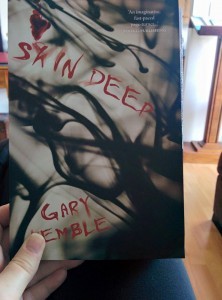 Very pleased to find this in the early post this morning: Skin Deep by my mate Gary Kemble. I critted this one a couple of years ago and am so happy to see it now in print! See, I even blurbed it.
Very pleased to find this in the early post this morning: Skin Deep by my mate Gary Kemble. I critted this one a couple of years ago and am so happy to see it now in print! See, I even blurbed it. 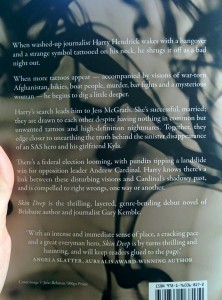 A big huzzah to the good folk at Five Mile Press/Echo Publishing.
A big huzzah to the good folk at Five Mile Press/Echo Publishing.



